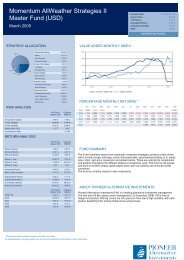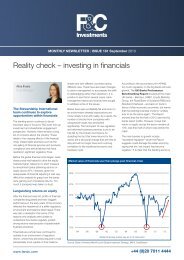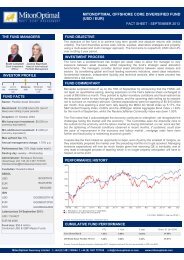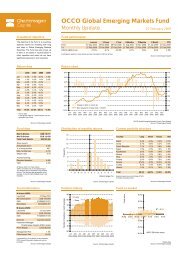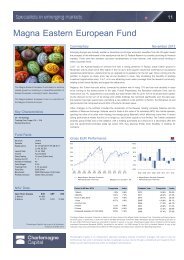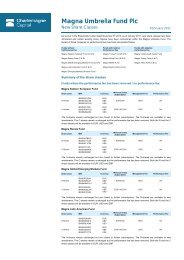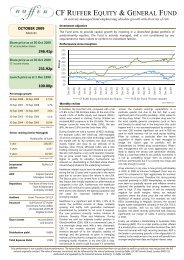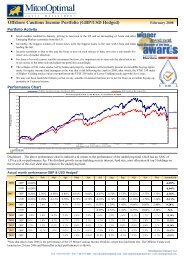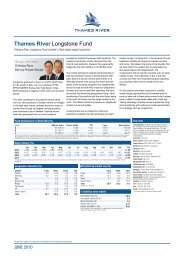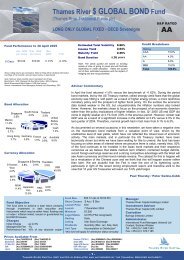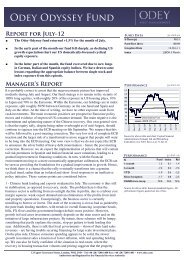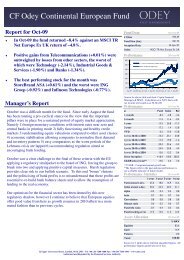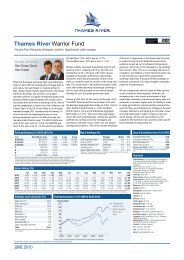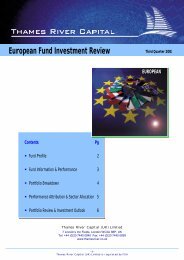Value Partners “A” Fund - Offshore-Rebates
Value Partners “A” Fund - Offshore-Rebates
Value Partners “A” Fund - Offshore-Rebates
Create successful ePaper yourself
Turn your PDF publications into a flip-book with our unique Google optimized e-Paper software.
<strong>Value</strong> <strong>Partners</strong> <strong>“A”</strong> <strong>Fund</strong><br />
(A Cayman Islands Unit Trust)<br />
MANAGER’S REPORT (Continued)<br />
The bulk of the fund is currently in shares of China-related small and medium enterprises (SMEs). We<br />
believe these smaller, more dynamic companies are the best way to participate in China’s growth. Our<br />
approach is different from that of the typical institutional fund, which mainly invests in the larger,<br />
mainstream China companies. While the larger companies tend to be state-owned enterprises, the<br />
SMEs are usually privately owned. Of course, to invest in the smaller companies, we need to have our<br />
own original research, as well as deep experience, but that’s what we have. During 2002, our research<br />
team carried out an estimated 500 company visits, across China and in Hong Kong, as well as some<br />
visits in Korea, Taiwan and Southeast Asia.<br />
As was the case a year previously, about three-quarters of our holdings is Hong Kong-listed. The rest<br />
of the portfolio is in China “B” shares; high-yield corporate bonds; and a few value-stocks listed in<br />
other East Asian markets such as Singapore and Taiwan, while about 3% of the fund is in cash.<br />
Although heavily exposed to Hong Kong-listed companies, we didn’t suffer much from Hong Kong’s<br />
troubled economy because we concentrate on companies whose activities are in China, rather than in<br />
the local economy. As explained previously, we are big in three investment categories:<br />
• Companies, many controlled by Hong Kong and Taiwanese entrepreneurs, with factories in<br />
China producing consumer goods for export;<br />
• Companies engaged in China’s domestic consumer market, such as autos;<br />
• Utility and infrastructure stocks and bonds offering high, sustainable yields.<br />
Outlook<br />
As many stockmarket investors have found, it has not been easy to make money from China’s strong<br />
growth, because many of the better known China plays are the wrong sort of investments, i.e. inefficient<br />
state-owned enterprises. Also, the market for China stocks – as well as Hong Kong stocks – tends to<br />
be emotional and momentum-driven, rather than based on fundamental value. Investors get whipsawed<br />
constantly. Furthermore, many of the major funds in the Hong Kong/China markets are reluctant to<br />
invest in stocks not included in such measures as the Hang Seng Index, because their performance is<br />
measured against an index; the result is that they don’t know or don’t care about attractive value<br />
offered by non-index stocks.<br />
Our view is that this is fertile ground for a value-investor with a contrarian approach. For us, the<br />
opportunities have grown because the market currently suffers from poor morale, meaning more<br />
bargains are being overlooked or thrown away. And China’s strong progress is providing numerous<br />
new opportunities, provided one invests based on fundamental analysis rather than speculation or<br />
emotion.<br />
<strong>Value</strong> <strong>Partners</strong> Limited, 17 April 2003<br />
4



